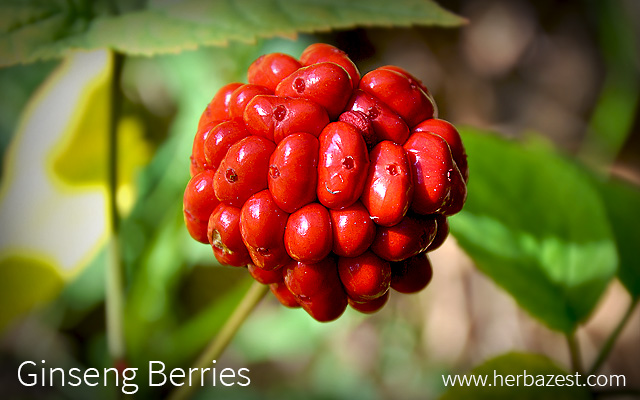For thousands of years, ginseng health benefits have been cherished, with the ginseng root receiving praise for being the most valuable part of the Panax plant. However, new research is beginning to suggest that the small, red ginseng fruit may in fact contains a higher concentration of active ingredients than the root.
Studies are discovering that the ginseng fruit contains great amounts of ginsenosides, which are believed to be greatly responsible for ginseng berry benefits. The ginseng fruit also holds larger amounts of vitamin E, vitamin K, vitamin B9 (folate), and potassium than the Panax root.
Importance of Ginseng Berries
Environmental Importance
Ginseng berries play a vital role in the existence of the entire ginseng species by carrying ginseng seeds. Once ginseng is harvested, farmers often plant the seeds in the same area to continue the cycle of growth.
In North America, the native wild ginseng (Panax quinquefolius) has become threatened by over-cultivation and has been listed in the Appendix II of the Convention on International Trade in Endangered Species of Wild Fauna and Flora (CITES), which means the plant may become extinct if trade is not carefully regulated.
In Wisconsin, a state well-known for its wild ginseng conservation program, farmers are required to replant all wild ginseng seeds within the vicinity of the parent plants when they harvest ginseng.
The seeds found within ginseng berries are essential to keep ginseng from going extinct.
Medicinal Importance
Most ginseng berry benefits are attributed to its high ginsenoside levels, which have been shown to be effective for treating a variety of medical conditions, boasting antidiabetic, anti-inflammatory, and antioxidative properties.
Numerous studies have tested the antidiabetic activity in the ginseng fruit. A study published in Diabetes (2002) discovered that ginseng berries normalized blood glucose levels by improving sensitivity to insulin, lowering cholesterol levels, and decreasing weight in obese, diabetic mice.
Another study, published in the International Journal of Impotence Research (2012), tested the effects of Korean ginseng berry extract in 119 men with mild to moderate erectile dysfunction. They found that ginseng berries can improve men's sexual function and suggest its use as an alternative treatment for such cases.
Additionally, a study published in the Journal of Ginseng Research (2016) suggests that an active agent in ginseng berries, called syringaresinol, possesses anti-aging qualities that activate genes to help extend one's lifespan.
Furthermore, preliminary research suggest that the ginseng fruit may have anti-inflammatory and antioxidant activities. Though the exact mechanism is yet to be known, it is also believed that an improvement of various neurological functions occurs thanks to the interaction of ginseng berries' active constituents with the cholinergic and serotoninergic neurotransmitter systems.
A variety of both Asian and American ginseng berry supplements are currently available, mostly through online retailers, and include ginseng berry juice, ginseng berry extracts, and ginseng berry extract capsules. Based on the alleged anti-aging properties of ginseng berries, the cosmetic industry also offers a variety of skincare products, such as creams, beauty masks, and ampoules for topical application.
Ginseng berries have proven valuable to the survival of the Panax species as well as for the treatment of many health conditions. Research on ginseng berries is still fairly new, and further studies will only help us to better understand their full potential.
Sources
- Diabetes, Antidiabetic effects of Panax ginseng berry extract and the identification of an effective component, 2002
- International Journal of Impotence Research, Effects of Korean ginseng berry extract on sexual function in men with erectile dysfunction: a multicenter, placebo-controlled, double-blind clinical study, 2012
- Journal of Ginseng Research, Effects of Korean ginseng berry on skin antipigmentation and antiaging via FoxO3a activation, 2016
- Natural Products Chemistry & Research, Ginseng Berry and its Biological Effects as a Natural Phytochemical, 2016
- United States Fish and Wildlife Service, CITES Appendix II Supports Sustainable Use
- USDA Economic Research Service, Growing ginseng
- Wisconsin Department of Natural Resources, Wild Ginseng Regulations and Guidelines for Sustainable Harvest
- Phytomedicine, Ginseng berry reduces blood glucose and body weight in db/db mice, 2014 | Anti-hyperglycemic effect of the polysaccharides fraction from American ginseng berry extract in ob/ob mice, 2004




